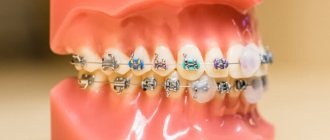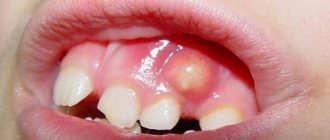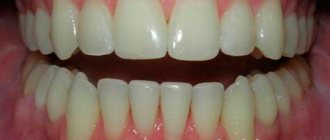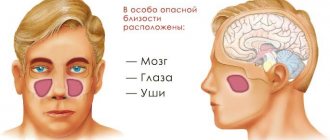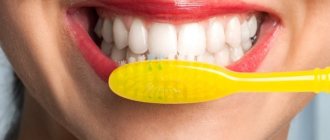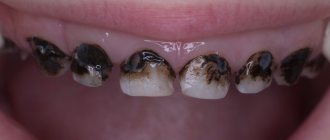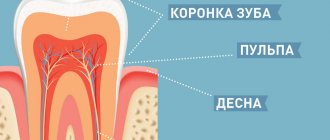Methods for restoring baby teeth
Depending on the condition of the teeth, various options for restoring their shape are used.
- Endodontic treatment. It consists of filling the canals and installing fillings. If the tooth is destroyed, a filling is placed at the gum level. The method allows you to preserve the tooth for as long as possible. The method is not aesthetic, but functional.
- Crown restoration. A complete restoration of the anatomical shape of the crown is performed. Specific children's crowns can be used, installed after tooth treatment. The technique allows you to restore aesthetics, but has an unpleasant feature - the development of secondary caries under the crown. There is also a possibility of the tooth breaking off at the gum, along with the crown.
Restoration of baby teeth in children has an important feature. It lies in the fact that the age of patients is mainly between one and four years. At this age, children cannot sit still for a long time, especially if the doctor manipulates their mouth. The doctor's jewelry work is required, so his qualifications and ability to find a common language with the child are decisive in the success of the procedure.
Why do children still need to restore their teeth?
Firstly, restoration of baby teeth makes it possible to preserve these teeth until their natural replacement, and, therefore, guarantees the normal eruption of permanent teeth.
Secondly, restoration of baby teeth protects the child from developing health problems caused by the inability to bite and chew food normally. In addition, milk teeth that have the correct shape are an indispensable condition for the baby to develop correct and clear diction.
Thirdly, restoration of baby teeth relieves the child of psychological problems associated with the absence of frontal teeth.
Why is restoration of baby teeth necessary?
An even dentition is an integral attribute of the normal development of the masticatory and facial apparatus. However, even if the teeth are naturally straight, no child is immune from falls, injuries, or serious caries. If a tooth falls out, the overall framework of the dentition is disrupted. Neighboring teeth may shift, the bite changes, diction deteriorates, and chewing function is impaired. If the jaw muscles do not form properly under these conditions, it will cause further problems with misaligned teeth and a malocclusion.
Restoration of the front tooth is necessary both for an aesthetic appearance and normal self-esteem, and for correct diction. Therefore, children's problems with teeth, even milk ones, should not be ignored by parents.
Why do children's teeth crumble?
There can be many reasons.
They are conventionally divided into 2 groups:
- External.
External ones include:
- mechanical impacts (impacts) leading to chipping or complete loss of the tooth;
- temperature fluctuations (hot, cold), causing cracks in the enamel;
- chemical damage to tooth enamel as a result of exposure to substances contained in liquids and food.
- Internal.
Internal ones include:
- composition of food and water consumed;
- metabolic disorders;
- hereditary factor;
- hormonal abnormalities;
- jaw abnormalities;
- other.
Let's take a closer look at them. It is known that baby teeth crumble in children due to chronic or acute diseases. Etiological factors include chronic diseases associated with metabolic disorders, dental caries, endocrine disorders, and heredity.
Chronic diseases
The destruction of children's teeth may indicate, for example, endocrine disorders or the presence of hereditary type 1 diabetes mellitus.
Attention: if your child is under five years old and his teeth are crumbling, then you should contact a specialist to find out the reasons. Some diseases disrupt the exchange of fluoride, iron, and vitamins inside the human body, leading to severe consequences.
Dental caries
Caries is caused by pathogenic microflora of the oral cavity, and no one can be immune from it. The causative agent is the well-known staphylococcus . First, the tooth enamel is affected, and then the next layer of the tooth - dentin, but, as a rule, carious teeth are found in children over 2 years old.
From this video you will learn about caries in children:
Nutritional factor
“We are what we eat” – this phrase also applies to teeth. Mono- and polysaccharides can destroy dentin and cause great harm to tooth enamel.
It is not surprising that this factor leads to tooth decay in children, since they love sweets very much. To exclude this pathology, it is enough to simply limit the consumption of sugars and carbohydrates.
Recommendation: It is very difficult to deprive a child of sweets. It would be wiser to give out one candy in the morning and in the evening with the obligatory rinsing of the mouth with water.
There are certain age periods when sugar consumption should be reduced to a minimum: when baby teeth begin to be replaced by permanent teeth.
Poor drinking water
Children one year of age are recommended to drink special water, which is sold at the pharmacy. This is due to the characteristics of their intestines and physiological dyspepsia.
Water must contain the required amount of microelements in its composition, namely:
- fluorine
- potassium
- calcium
- sodium
- chlorine.
During the maturation of baby teeth, the above listed microelements, obtained specifically from water, are required to strengthen them. Their deficiency may well cause problems with the front teeth. To confirm the lack of microelements, it is necessary to conduct a biochemical blood test, and only after that adjust the water-salt balance.
Genetic conditioning
Unfortunately, the hereditary factor cannot be completely cured. The only thing doctors can recommend is vitamin therapy and strengthening teeth with special pastes.
Also, if a genetic predisposition to tooth decay is diagnosed, you will have to visit the dentist at least once every three months.
Congenital defects of the jaw apparatus
Occlusion plays a very important role in diseases of the oral cavity, especially in children. Incorrect alignment of the upper and lower jaws can cause enormous damage to the teeth. Because during chewing, the teeth begin to fit tightly against each other, thinning the enamel more. In children suffering from such a defect, their teeth not only crumble, but break.
Benefits of restoration
- Complete chewing of food, without which it cannot be sufficiently absorbed by the body.
- Reducing the likelihood of improper germination of permanent teeth due to the absence of interference.
- Normal speech development.
- Self-confidence, beautiful smile.
Dental restoration in children at Dr. Davtyan’s implantology clinic is carried out using the latest dental technologies.
- Treatment of caries.
- Remotherapy.
- Removal of baby teeth.
- Fissure sealing.
Solving dental problems at an early age is the key to healthy teeth in the future. Therefore, it is important to bring your child to the doctor’s office not only for treatment, but also for preventive examinations and conversations about oral health. This will help give the right attitude for the future and relieve the child of fear of dentists.
Infections in baby teeth and tooth decay are serious problems that, if left untreated, can lead to other, more widespread consequences affecting soft tissue and bone. Primary malocclusion, which occurs as a result of tooth loss at an early age, is one of the causes of curvature of the dentition and distortion of the bite during the change of teeth to permanent ones.
Careful care and timely measures taken to restore the health of the oral cavity are the key to the health of the body as a whole.
Ozonation
Ozone is a strong oxidizing agent. Able to penetrate into the affected parts of the teeth and not affect healthy tissue. Destroys bacteria, sterilizes tissue, prevents relapse of caries, strengthens enamel.
A special silicone cap is applied to the tooth, from under which the air is sucked out. Ozone is supplied to the cap, affecting the microflora and destroying pathogenic microorganisms in 30 seconds. With the help of the procedure, you can get rid of minor carious effects. In other cases, drilling is indispensable. The method stops tooth decay.
Interesting facts about baby teeth:
- The root of a baby tooth dissolves before falling out. This is facilitated by the growing molar tooth. And there is no need to loosen the milk one.
- Almost all of the body's calcium is concentrated in them.
- The child has a total of 20 of them.
- They also need to be treated, otherwise pathogenic microorganisms will negatively affect the immune system.
- Their formation occurs at 7-13 weeks of the mother's pregnancy.
- The appearance of the first baby tooth means that it is time for the baby to start eating solid food.
We invite you to familiarize yourself with How to prevent tartar: the causes of the disease, preventive measures and practical recommendations
Why is it better to choose Dr. Davtyan Clinic
Dental treatment, especially when it comes to children’s teeth, is a complex and responsible task for a specialist. A tooth is not just needed for chewing. Correct dentition is a prerequisite for excellent well-being and maintaining the health of the whole body. A bad experience visiting the dentist in childhood will inevitably leave an imprint on the memory and may contribute to the development of dental phobia in the future.
The team of the implantology clinic - therapists, orthopedists, surgeons - are leading experts in their field. Their professionalism is complemented by attending advanced training courses, specialized trainings and seminars not only in the Russian Federation, but also in Europe and the USA. We combine proven classical methods with innovative solutions to achieve excellent results.
Our advantage is our interest in your health and the ability to find an approach to each patient. If you dream of a dazzling smile for yourself or your child, choosing Dr. Davtyan Clinic will be the best decision. Restore your health in a comfortable environment thanks to our jewelry work.
Prices
The cost of services varies depending on many factors, including the clinical picture and the chosen course of treatment. You can find out more detailed information about treatment methods and costs by making an appointment. You can do this in any of the ways convenient for you:
- By email,
- By phone,
- Using Viber and WhatsApp applications,
- During a personal visit to the clinic.
| Name | Price from (RUB) |
| Treatment of caries of primary teeth | 3500 |
| Remotherapy | 200 |
Treatment
Treatment of crumbling teeth consists, first of all, in eliminating one of the causes listed above (except genetic diseases) that led to such a negative situation. The choice of a specialist who can help resolve the problem depends on this.
As for correcting the consequences, there are several procedures that can strengthen decaying baby teeth, if this is still possible, of course. methods are considered the main ones :
- fluoridation (painless saturation of tooth enamel with fluoride ions);
- silvering (using silver nitrate, which often leads to harmless darkening of the enamel);
- fissure sealing (filling gaps in the enamel layer with filling material).
Fluoridation is one of the methods of strengthening enamel.
Do not forget about the necessary daily oral hygiene, as well as proper nutrition, almost completely excluding sweets and excessively hard foods. Regular rinsing of teeth with various balms and herbal decoctions, which can be purchased at the pharmacy, will also provide all possible assistance.
